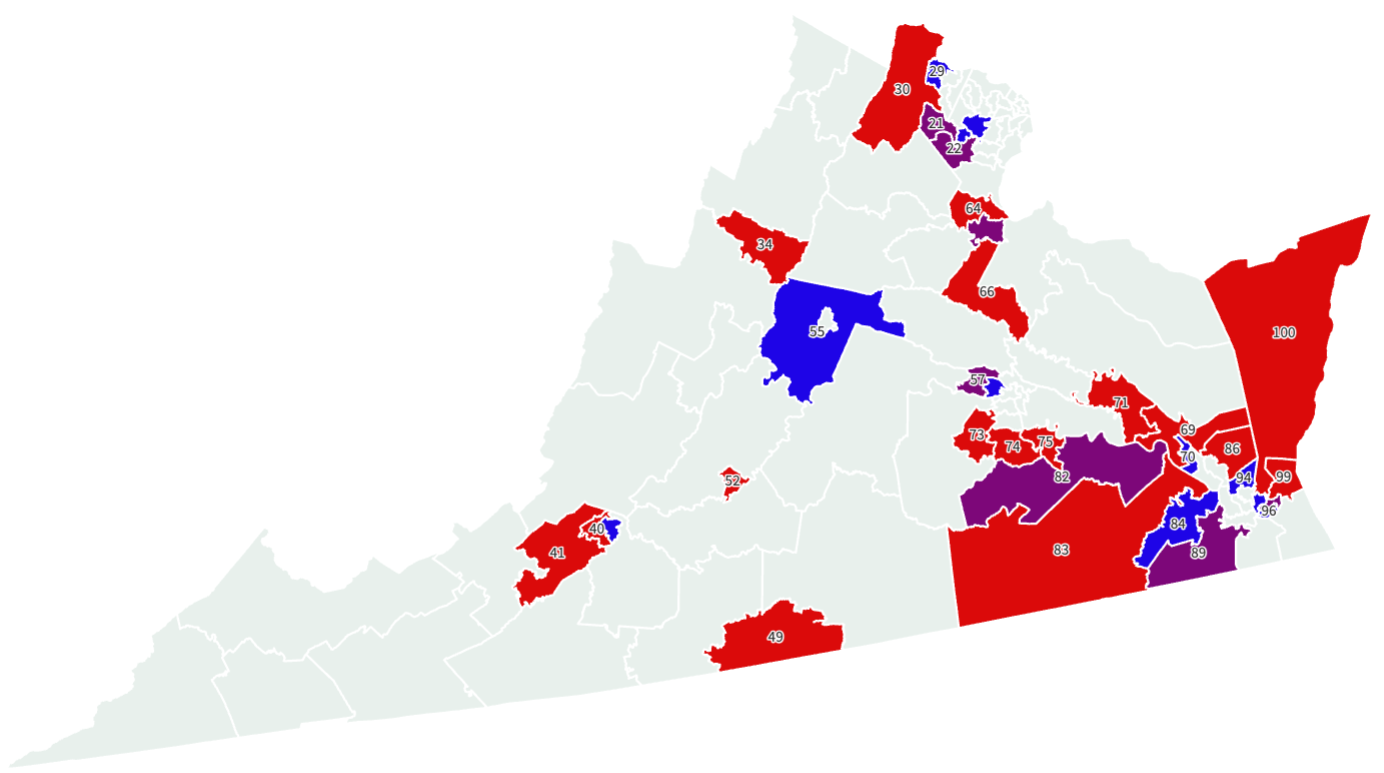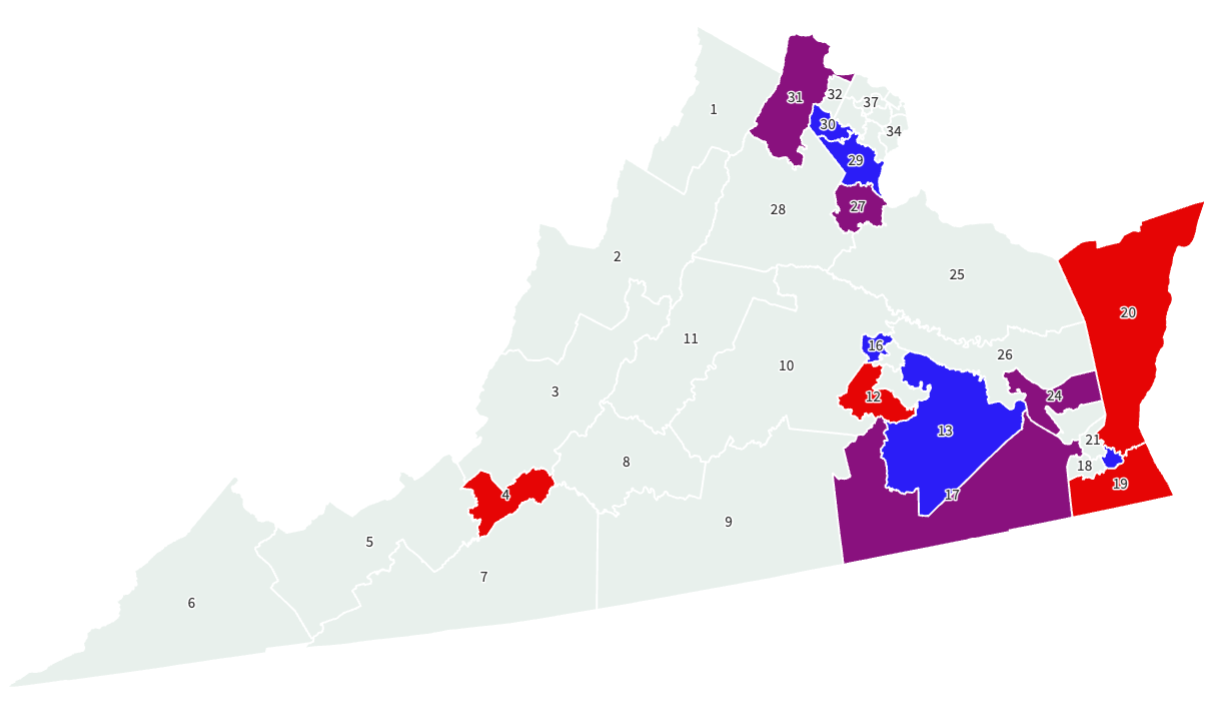Voters head to the polls Tuesday to weigh in on critical gubernatorial, legislative and local races across the country in the last major gauge of the electorate’s mood ahead of next year’s presidential contest.
Every race is different, but some broad themes have emerged: Democrats have used elections this year to road test messages about abortion rights, two years after the U.S. Supreme Court struck down Roe v. Wade and left those rights up to the states. Republicans have offered conflicting responses on abortion restrictions, focusing their paid advertising more on inflation, crime and parental rights in schools.
Here’s a quick guide to the races to watch in Tuesday’s elections:
Kentucky: Gov. Andy Beshear (D) faces Attorney General Daniel Cameron (R) in a Republican-leaning state with plenty of ancestral Democrats — voters who remain registered with the Democratic Party despite shifting to the right in recent years. Beshear has dominated the airwaves and the spending wars, and despite Kentucky’s rightward lean, Democrats have won all but two gubernatorial contests in the last half century.
A late poll conducted by Emerson College shows a statistically tied race. A Cameron win would represent a huge upset for the GOP.
Republican Secretary of State Michael Adams (R) is likely to cruise to re-election. Republicans are favored in open seat races for Attorney General, state Treasurer, state Auditor and state Agriculture Commissioner.
Mississippi: Gov. Tate Reeves (R) faces Public Service Commissioner Brandon Presley (D) in a rare race where abortion rights haven’t been a big issue — Presley, like Reeves, opposes abortion rights. Instead, the two have traded allegations of corruption, and much of the debate has revolved around whether to expand Medicaid.
The few polls in the race show Reeves with a solid lead, but Republicans have gotten anxious in recent weeks as voters tune in. Like in Kentucky, a Presley win would be a big upset — this time for Democrats.
Republican incumbents are running for re-election in seven downballot statewide races. All are likely to cruise to new terms.
Mississippi Republicans are also likely to maintain big majorities in the state House, where they hold 71 of 105 seats, and the state Senate, where they control 36 of 52 seats. There are enough districts in both chambers where a Republican is running without a Democratic challenger that the GOP would maintain a majority even if Democrats were to win every race in which they fielded a candidate.
Virginia: All 40 state Senate districts and all 100 House of Delegate districts are up for election this year, in contests that have cost more money than ever before. National Democrats and Gov. Glenn Youngkin (R) have both poured millions into narrow battles for control; Republicans hold just a two-seat advantage in the House of Delegates, while Democrats have a four-seat margin in the Senate.
Seven seats in the House of Delegates — districts 21, 22, 57, 65, 82, 89 and 97 — are competitive, according to the Virginia Public Access Project, a nonpartisan analyst.

Competitive districts in purple.
In the Senate, districts 17 (Hampton Roads), 24 (Peninsula), 27 (Fredericksburg) and 31 (Loudoun and Faquier counties) are going to be the majority-makers.

Competitive districts in purple.
New Jersey: All 40 Senate districts and 80 General Assembly seats are up for election this year. Republicans had a surprisingly good showing in 2021, but Democrats still hold a 10-seat majority in the Senate and a 12-seat edge in the General Assembly. Democrats are expected to maintain, and even grow, their advantages in the Garden State.
Ohio: Voters will decide whether to add an amendment guaranteeing the right to an abortion to their state’s constitution, making Ohio the only state where abortion is literally on the ballot this year. The measure, Issue 1, has attracted $71 million in spending, with an advantage to the pro-abortion rights side. Polls show the measure is likely to win passage.
Ohio voters will also decide whether to legalize marijuana for recreational use. Voters there rejected a 2015 effort to legalize pot, one of the few times marijuana legalization has failed at the ballot — after supporters rolled out a widely mocked marijuana bud mascot. This time, a more professional and sober campaign appears likely to win passage.
Maine: Voters in Maine face eight ballot questions, the most interesting of which revolve around a proposal to create a publicly owned utility company.
Question 3 asks voters whether to establish a Pine Tree Power Company, a public utility that would purchase and acquire all investor-owned transmission and distribution utilities in the state. Maine’s two big power companies, Central Maine Power and Versant, have spent more than $37 million opposing the initiative, while supporters have spent just over $1 million.
The power companies have also placed their own backup measure on the ballot. Question 1 will require voter approval for state entities — like, say, a publicly-owned utility — to take on debt of more than $1 billion, which Pine Tree Power Company would certainly have to do to acquire the investor-owned utilities’ assets.
If both measures pass, expect a long court fight ahead.
Question 2 would ban election spending by foreign governments and companies with partial foreign ownership. Question 7 would end a requirement that anyone gathering signatures for future ballot measures be a resident or registered voter in Maine. Question 4 would allow motor vehicle owners and independent repair facilities to have access to on-board diagnostic systems, a narrow right-to-repair measure.
Texas: Texas voters will have 14 propositions to consider, most of which are minor technical adjustments — one eliminates the Galveston County treasurer’s office, and others create funds for parks conservation, energy projects, water projects and broadband infrastructure.
Among the more consequential measures is Proposition 3, which would prohibit taxes on wealth or net worth. Proposition 4 would increase the homestead tax exemption and boost funding for public education. Proposition 1 would create a constitutional right to farming, ranching and wildlife management.
Colorado: Voters here will be asked whether to limit property taxes and whether to increase taxes on cigarettes and other tobacco products.
Pennsylvania: Voters will choose between Daniel McCaffery (D) and Carolyn Carluccio (R) in a race that has become the most expensive state Supreme Court contest in the Commonwealth’s history. The winner won’t change the balance of power on the high court — even if Carluccio carries the day, Democrats will still hold four of seven seats.
But the race has become a proxy fight over abortion rights and redistricting, similar to a Wisconsin Supreme Court battle earlier this year. Special interest groups — the ACLU for McCaffery and groups backed by billionaires Jeffrey Yass and Richard Uihlein for Carluccio — have spent more than $17 million on the race, including $12 million since Labor Day alone.
Local elections: Voters in Philadelphia are likely to pick former city council member Cherelle Parker (D) as their next mayor, replacing term-limited Mayor Jim Kenney (D). No Republican has won the mayor’s office since 1947.
Wichita Mayor Brandon Whipple is seeking a second term against former television news anchor Lily Wu, who finished first in the August 1 primary. The race is ostensibly nonpartisan, though Whipple is a Democrat and Wu is a former Republican.
Voters in Miami, Orlando, Des Moines, Boston, Minneapolis, St. Paul, New York City, Cincinnati, Cleveland, Columbus, Philadelphia, Pittsburgh, Houston, Salt Lake City and Seattle will all elect city council members.

